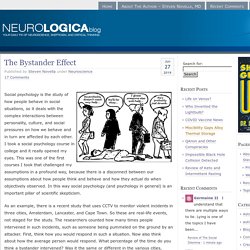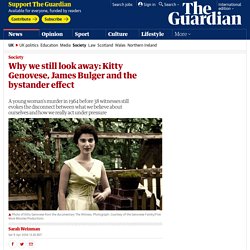

The Bystander Effect. Social psychology is the study of how people behave in social situations, so it deals with the complex interactions between personality, culture, and social pressures on how we behave and in turn are affected by each other.

I took a social psychology course in college and it really opened my eyes. This was one of the first courses I took that challenged my assumptions in a profound way, because there is a disconnect between our assumptions about how people think and behave and how they actual do when objectively observed. In this way social psychology (and psychology in general) is an important pillar of scientific skepticism. As an example, there is a recent study that uses CCTV to monitor violent incidents in three cities, Amsterdam, Lancaster, and Cape Town.
So these are real-life events, not staged for the study. Your answers to these questions probably say more about you and the culture you live in than reality. Here is a summary of the study. Bystander effect. Bystander effect, the inhibiting influence of the presence of others on a person’s willingness to help someone in need.

Research has shown that, even in an emergency, a bystander is less likely to extend help when he or she is in the real or imagined presence of others than when he or she is alone. Moreover, the number of others is important, such that more bystanders leads to less assistance, although the impact of each additional bystander has a diminishing impact on helping. Investigations of the bystander effect in the 1960s and ’70s sparked a wealth of research on helping behaviour, which has expanded beyond emergency situations to include everyday forms of helping. By illuminating the power of situations to affect individuals’ perceptions, decisions, and behaviour, study of the bystander effect continues to influence the course of social psychological theory and research. Bystander intervention Get exclusive access to content from our 1768 First Edition with your subscription.
The bystander effect - Economic and Social Research Council. Why we still look away: Kitty Genovese, James Bulger and the bystander effect. More than half a century later, the death of Kitty Genovese continues to remind us of the disconnect between what we believe about ourselves and how we really act under pressure.

The murder of the 28-year-old outside her apartment in the Queens neighborhood of Kew Gardens in the early morning of 13 March 1964 rippled through New York City and around the world. How could a young, independent woman who lived on her own terms be so easily struck down? How could so many neighbors look on and turn away as she was stabbed repeatedly on the street and in her apartment building? What did that collective inability to act reveal about ourselves, our communities, and our belief systems? Genovese’s killer, Winston Moseley, died in prison this week, bringing the case and its implications back into the spotlight. Two weeks after her murder, Rosenthal assigned a story with the damning headline: “Thirty-Seven Who Saw Murder Didn’t Call Police.” Take the story of Hugo Alfredo Tale-Yax.